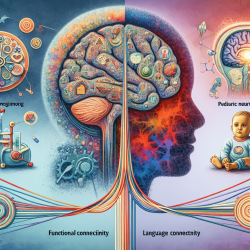As practitioners in the field of speech-language pathology, we continuously seek evidence-based methods to enhance our therapeutic outcomes. A recent study titled "Proof of Concept: A Brief Psycho-Educational Training Program to Increase the Use of Positive Emotion Regulation Strategies in Individuals With Autism Spectrum Disorder" offers groundbreaking insights into improving emotional regulation (ER) strategies in individuals with autism spectrum disorder (ASD). Let's delve into the study's findings and explore how they can revolutionize our practice.
The Importance of Positive Emotion Regulation
Emotional regulation difficulties, such as heightened anxiety and aggression, are common in individuals with ASD and can significantly impair their social and emotional functioning. Traditional interventions often focus on mitigating negative emotions. However, the novel approach of enhancing positive emotions has shown promising benefits, including improved resilience and overall well-being.
Key Findings from the Study
The study involved a three-session multimedia training program targeting three main adaptive ER strategies: attentional deployment, cognitive change, and response modulation. Here are the pivotal findings:
- Participants rated the program as easy to understand, interesting, and pleasant, with no dropouts or adverse effects.
- The training group showed a significant increase in the use of ER strategies compared to the waitlist group, which maintained up to 7 weeks post-training.
- An exploratory analysis indicated an increase in the use of humor as an adaptive ER strategy, though further validation is needed.
Implementing the Findings in Practice
Based on the study's outcomes, practitioners can integrate the following strategies into their therapy sessions:
- Attentional Deployment: Encourage children to focus on positive aspects of their environment and engage in activities they enjoy.
- Cognitive Change: Teach children to reframe negative experiences positively and emphasize the bright side of events.
- Response Modulation: Promote the expression of positive emotions through activities like smiling, laughing, and sharing joyful experiences with others.
Encouraging Further Research
While the initial findings are promising, further research is essential to explore the long-term effects of positive ER strategies on day-to-day emotional experiences and overall well-being in individuals with ASD. Practitioners are encouraged to stay updated with ongoing research and consider participating in studies to contribute to the growing body of knowledge.
Conclusion
The study underscores the potential of positive ER strategies in enhancing the emotional and social functioning of individuals with ASD. By incorporating these strategies into our practice, we can foster better outcomes for the children we serve. To read the original research paper, please follow this link:
Proof of Concept: A Brief Psycho-Educational Training Program to Increase the Use of Positive Emotion Regulation Strategies in Individuals With Autism Spectrum Disorder.










